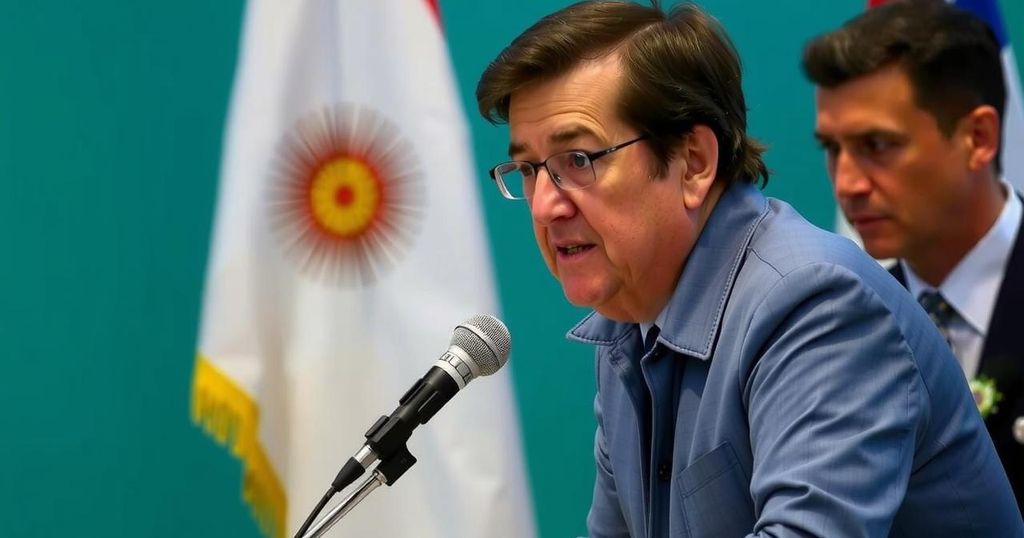Global news
ARGENTINA, ASIA, AUDIT PLANNED FOR, BRAZIL, DIPLOMACY, FOREIGN POLICY, FOREIGN RELATIONS MINISTRY, GERARD, ISRAEL, JAVIER MILEI, MANUEL ADORNI, MILEI, MONDINO, N. GENERAL ASSEMBLY, NEWSWEEK, NORTH AMERICA, RELATIONS MINISTRY, SOUTH AMERICA, TEL AVIV, TRADE RELATIONS, U. N. GENERAL ASSEMBLY, UNITED NATIONS, UNITED STATES
Fatima Khan
0 Comments
Argentina’s President Milei Dismisses Foreign Minister Following Controversial UN Vote on Cuba
On Wednesday, President Javier Milei dismissed Foreign Minister Diana Mondino following Argentina’s support of a U.N. resolution to lift the U.S. embargo on Cuba. Mondino’s termination is reportedly linked to the vote, which contradicted the Milei administration’s position against the Cuban regime. Milei has shifted Argentina’s foreign policy toward closer ties with the U.S. and Israel, especially during ongoing regional conflicts. An internal audit of the Foreign Relations Ministry is planned to address potential policy conflicts.
On Wednesday, President Javier Milei of Argentina removed Foreign Minister Diana Mondino from her position, a decision that follows the country’s support for a United Nations resolution aimed at lifting the U.S. economic embargo on Cuba. The abrupt dismissal led to Mondino being succeeded by Gerardo Werthein, Argentina’s ambassador to the United States, as per the announcement made by spokesman Manuel Adorni via social media. The specific reasons for Mondino’s termination were not explicitly stated; however, President Milei’s office later clarified that the decision was directly linked to the recent controversial U.N. vote. “Our country is categorically opposed to the Cuban dictatorship, and it will remain firm in promoting a foreign policy that condemns all regimes that perpetuate the violation of human rights and individual freedoms,” the President’s office asserted. This resolution to lift the embargo saw support from 187 nations, with only the United States and Israel opposing it. Since taking office in December 2023, President Milei has realigned Argentina’s foreign policy to closely associate with the interests of the United States and Israel. He has demonstrated open support for Israeli Prime Minister Benjamin Netanyahu’s government amid military actions in Gaza, which is particularly notable given the contrasting positions taken by other Latin American nations; countries such as Bolivia and Colombia have severed diplomatic relations with Israel, while Brazil and others have recalled their ambassadors from Tel Aviv, underscoring a significant regional divide on the matter. Diana Mondino’s tenure as Foreign Minister has been tumultuous, illustrated by previous controversies, including a retraction of a press release that incorrectly referred to the contested territory of the Falklands instead of the recognized Argentinian term Malvinas. Additionally, she faced criticism for insensitive remarks made regarding the Chinese populace during a visit to China, which led to concerns over perceived instability within the Foreign Relations Ministry. In connection with Mondino’s removal, President Milei’s administration has announced plans to conduct an internal audit of the Foreign Relations Ministry. The purpose of this initiative is to identify individuals within the ministry advocating agendas that may conflict with the government’s stance on human rights and freedom. As Argentina maneuvers through this transitional phase, the ramifications of these modifications on its foreign relations remain unclear, as Milei’s administration positions itself to redefine its international stance amid a rapidly changing geopolitical landscape.
The dismissal of Foreign Minister Diana Mondino by President Javier Milei marks a significant shift in Argentina’s foreign policy, especially in its stance toward Cuba and broader relations with the United States and Israel. The backdrop of this decision is a recent United Nations vote in which Argentina supported a resolution to lift the U.S. economic embargo on Cuba, a move at odds with the Milei administration’s stated policies that align closely with U.S. interests. Furthermore, Mondino’s controversial comments and the subsequent internal issues within the Foreign Relations Ministry highlight a turbulent period in Argentine diplomacy. The political realignments within the government reflect a broader trend in Latin America, where differing stances towards Israel and its actions in Gaza have led to a fracturing of regional relations.
In conclusion, President Javier Milei’s striking decision to dismiss Foreign Minister Diana Mondino signifies a pivotal change in Argentina’s foreign relations, particularly regarding its stance on Cuba and its alignment with U.S. interests. With plans for an internal audit of the Foreign Relations Ministry, Milei’s administration appears committed to ensuring compliance with its vision of promoting human rights and condemning dictatorial regimes. The consequent implications of these changes on Argentina’s international relations will shape its diplomatic posture moving forward in the current geopolitical climate.
Original Source: www.newsweek.com




Post Comment